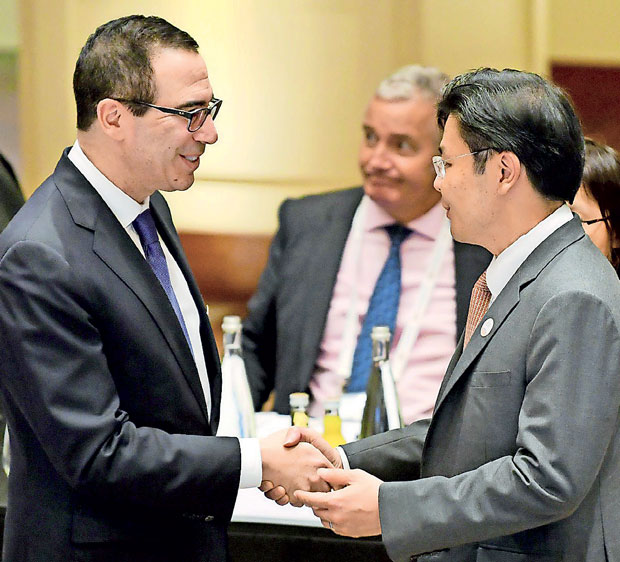22 Mar 2017 - {{hitsCtrl.values.hits}}
 US Treasury Secretary Steven Mnuchin (left) shakes hands with Singapore’s National Development Minister Lawrence Wong during G20 meeting
US Treasury Secretary Steven Mnuchin (left) shakes hands with Singapore’s National Development Minister Lawrence Wong during G20 meeting
 Some worrying headlines have come out of the meeting of G20 finance ministers and central bank governors in Germany over the weekend. The headlines warn that the G20 has been ‘steamrolled’ by the new Trump administration into scrapping its decade-long tradition of stating its opposition to protectionism in its communiqués.
Some worrying headlines have come out of the meeting of G20 finance ministers and central bank governors in Germany over the weekend. The headlines warn that the G20 has been ‘steamrolled’ by the new Trump administration into scrapping its decade-long tradition of stating its opposition to protectionism in its communiqués.
But many of these reports are exaggerated. It is incorrect to say that the G20 has abandoned its commitment to resisting protectionism. The meeting did show that the G20 will face serious challenges. It must resist the protectionist push coming from the Trump administration while finding a way forward on trade within a new and complex political environment.
Media reports released after last weekend’s meeting have suggested that the G20 has broken a ‘decade-long’ tradition of pledging to resist protectionism. Thankfully, this is not correct. Throughout Australia’s G20 host year in 2014, for example, finance ministers and central bank governors never made any commitment to fight protectionism at any of their four meetings.
The reason for this is straightforward. The G20 divides responsibility for different policy areas between finance ministers and sherpas (the officials who advise leaders). Finance ministers don’t have responsibility for trade. Sherpas do. This is why finance ministers did not commit to fighting protectionism during Australia’s host year and why reports that the G20 has broken a decade-long tradition at this recent meeting are incorrect.
But while it may be too early to write off the G20’s commitment to resisting protectionism, there is trouble on the horizon. Concerning reports are emerging that finance ministers in Germany tried to include this commitment in the communiqué but were prevented from doing so by the United States. It has been reported that China’s officials worked furiously behind the scenes to try to thwart the push from the United States for revised wording on trade. After the meeting, Germany’s finance minister Wolfgang Schäuble reportedly said ‘we have reached an impasse’ on trying to avoid protectionism ‘because it meant different things’ to different countries.
If these reports are correct then there are plenty of reasons to be concerned. The question for the G20, though, is what should be done about it.
When reporting on this issue, many commentators seem to forget that the G20 is a consensus forum. This means that it cannot act without the unanimous agreement of all 20 countries, such that each country has an effective veto. Arguments that the G20 should simply oppose the Trump administration and push ahead on promoting free trade ignore this critical point. In short, nothing can happen on trade in the G20 without US endorsement.
In light of this, the G20 needs to do two things. First, it needs to resist the outright protectionist push coming from the Trump administration. If reports are correct that the recent meeting in Germany was ‘19 against one’ then the G20 seems to be doing well. But this is just rhetoric. If Trump follows through on his commitments to enforce a border tax and taxes on US companies that move offshore, while continuing to retaliate against China’s allegedly undervalued currency, then G20 countries need to be ready to step up their concerted pressure on the United States to protect the global system.
But the G20 cannot settle with a stalemate either. It needs to find a way forward on trade within this new political environment. The good news is that finance ministers did not simply choose to avoid mentioning trade. Instead, they came up with a compromise text that they are ‘working to strengthen the contribution of trade to our economies’. This gives G20 countries something to work with.
Given substantial disagreements between members, the G20 needs to focus its efforts on analysis and more effective political messaging. It should commission independent analysis on the cost of protectionism and, conversely, how the benefits of trade are dispersed across different groups in the community. A recent study published in the Quarterly Journal of Economics found that, on average, the real income loss from closing off trade is 28 percent for the richest percentile of society but a much larger 63 percent for the poorest. On the basis of this study, populist politicians who purport to attack free trade in defence of the poor are either ignorant or disingenuous.
Commissioning in-depth analysis on the impacts of trade protectionism is a practical way for the G20 to move forward on its trade agenda. It is also something which is difficult for the United States to oppose given the substantial concerns the Trump administration has raised on the impacts of trade on US workers.
The awkward meeting between Trump and Merkel in Washington suggests much of the cooperation between the US and Germany this year will fall to ministers and officials. Until the leaders meet in July, this means all eyes will be on the next meeting of finance ministers in April.
(East Asia Forum)
(Adam Triggs is a research scholar at the Crawford School of Public Policy, ANU. He was formerly a member of the Australian G20 Task Force)
09 Jan 2025 1 hours ago
09 Jan 2025 2 hours ago
09 Jan 2025 2 hours ago
09 Jan 2025 2 hours ago
09 Jan 2025 2 hours ago